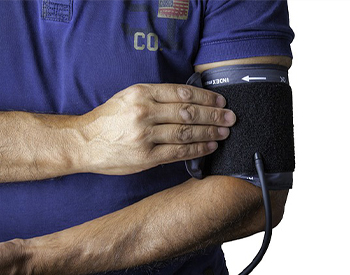Photo of many with blood pressure cuff on his arm.
What Is Blood Pressure?
Posted on 09/15/2017 by AHMC Anaheim Regional Medical CenterIf you have an annual wellness exam, or you have recently been seen by a doctor, chances are you got your blood pressure checked. However, as common a practice as taking one's blood pressure might be, many do not actually know what blood pressure is or what their numbers mean in correlation to their health and well-being. Continue reading to learn more about the significance of your blood pressure numbers.
What Does it Mean?
Blood pressure is the force of blood moving through your arteries, which carry blood from your heart to the rest of your body. It is measured by 2 numbers. For example, while checking your blood pressure, a nurse might tell you that your blood pressure is 120 over 80. The top number, 120, is the force of blood in your arteries when your heart beats; this is also referred to as "systolic pressure." The bottom number, 80, measures the force of blood in your arteries when your heart is relaxed, which is also known as diastolic pressure. If your blood pressure really was 120 over 80 or lower, it would be considered ideal.For those suffering from a condition like diabetes or kidney disease, a blood pressure lower than 130 over 80 would be considered good, though lower than that would be ideal.
What Is High Blood Pressure?
If an individual has high blood pressure, it is known as hypertension. Having this condition is much like a car tire with too much air in it. If your blood pressure is not reduced, you are at risk for damage to your eyes, brain, heart, blood vessels, and kidneys.Blood pressure that is 140 over 90, or higher, is considered high and requires treatment. Unfortunately, it is not accompanied by symptoms, which is why it is so crucial for you to regularly get it checked. High blood pressure puts you at significant risk of stroke.
Who Is at Risk for High Blood Pressure?
Everyone should regularly get their blood pressure checked, but those who are at a greater risk for high blood pressure should also talk to their doctor to learn how to avoid or control high blood pressure.If one or more of the following is applicable to you, you could be at risk:
You are over the age of 50
You are overweight or obese
You are a smoker
You have diabetes
You have kidney disease
You are a man who drinks more than an ounce of alcohol a day
You are a woman who drinks more than half an ounce of alcohol a day
Another member of your family suffers from high blood pressure
Controlling High Blood Pressure
If you have high blood pressure, the good news is that there are some steps you can take to control it. These include:Visiting your healthcare provider or a clinic for a check-up, which should include a blood pressure reading. If follow-up appointments are necessary, be sure to keep them.
Work closely with those who are treating you. Doctors, nurses, and other medical professionals are often available to help you manage your health concerns.
Blood pressure machines are available for purchase and are relatively inexpensive. You can use it to regularly monitor your blood pressure at home. Be sure to record your readings and share them with your doctor on your next visit.
Your healthcare provider will likely recommend some lifestyle changes or possibly prescribe medication to help lower your blood pressure.
This article contains general information about medical conditions and treatments. The information is not advice and should not be treated as such. The information is not intended to replace the advice or diagnosis of a physician. If you have any specific questions about any medical matter you should consult your doctor or other professional healthcare providers.

